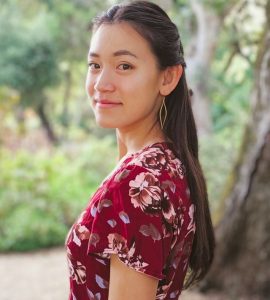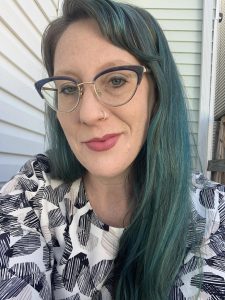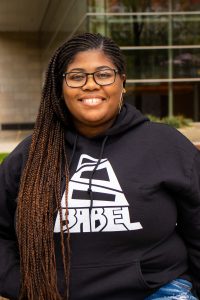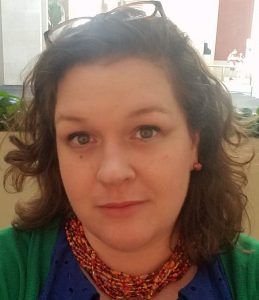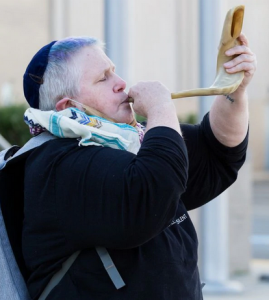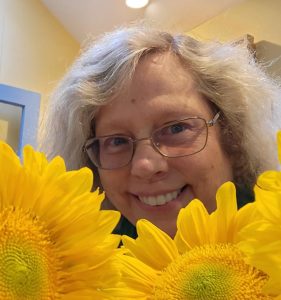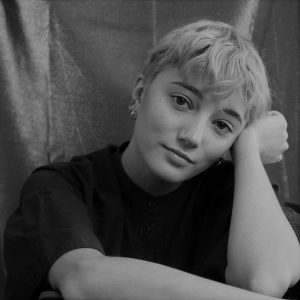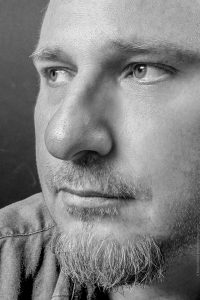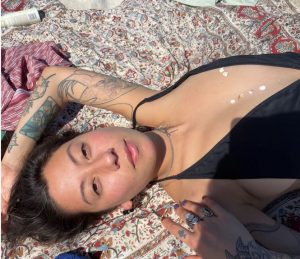
Runner Up: 2022 Sandy Crimmins Poetry Contest
Hello sounded like a new language
from her mouth. Intergalactic sparkle
of passionfruit lip gloss. Stuck her finger
through the threads where my thighs
rubbing together, wore away my jeans.
New clothes much? she smirked. Her mother looked me up
and down in the doorway, worried. I was mesmerized
by the kitchen pantry. Gleam of hardwood.
In framed photographs: Gwen in black velvet riding helmet.
Gwen at art camp. Gwen on stage with other porcelain doll
children, tip-toe in pale tulle. Moon lowered
behind her on its rope. There was a time I would’ve been jealous
but, seventeen now, all I wanted was to obliterate
the parentless house of my body, glow white
under blacklights, blast my hair straight
on the highway, pierce any flesh I could pinch. To meet crushes
late night at the gate of her cul-de-sac. Gwen, in neon makeup
and Bjorkian rags, denim that was purposefully and expensively
ripped or frayed or bleached. I learned
glamorous damage, felt royal
in her clothes. And she gave generously—
purple bomber jacket with fox fur hood,
white corduroy bellbottoms, rainbow holographic
wallet with the silver unicorn zipper.
Even once, an antique locket, her grandparents’
portraits inside, frowning at me, a stranger.
Odd that she gave it away. Odd that I wore it.
We read how Yoko won Lennon’s heart & we began
writing yes all over the walls. Across the dashboard, in the bathroom stalls
at school. Yes, yes. Our chant. I’d see one of her yes’s carved
into a desk when we were classes apart
and burn with our girlish devotion.
Yes to the tongue-ringed music video skater
rolling a blunt in slow-motion, yes all over Johnny’s face
in her Cry-Baby poster, yes on repeat to the song that still transports me.
To the indulgently foamed push-up bras, ordering $80 of food
on Mother’s stolen credit card and throwing it all up—
what we once called fun. To the roof where we sat
` to watch night collapse over everything.
We were a spectacle
in her father’s convertible, trading
seats so she could ride shotgun and pack the bowl.
Her chair tilted all the way back as I drove,
sound system vibrating the leather.
Gwen, I see you clearer now: her fascination with boys
she called troubled, who were banned from the mall,
who her father called shitheads, whose fathers punched
or burned them with cigarettes. The romancing of terrible wounds.
Gwen thought the work boots I duct taped together
when I was kicked out in the rain
were charming.
I still remember the mesh canopy of her princess bed,
like the room a willow makes inside.
Our den of hoarded cigarettes, bottles her parents
didn’t notice disappear, hard candy, gel pens,
Adderall, packs of gum. On vacation with her family
in Bermuda, we tore pages out of the hotel bible
& burned them on the beach, dared God to curse us.
Set off fireworks and ran hand-in-hand
when the cops came. Our LSD eyes engorged
on the Grand Canyon: so willfully red
beneath the rawhide sun. Or Colorado, us half asleep in hot springs
in the snow. I just wanted to go everywhere with her
and she wanted to bring me, like a treasured stuffed animal
or a groupie, so easily-amazed How did her parents see me—
a parasite teen coaching their daughter toward risk?
Or a mangy stray their big-hearted only-child
brought home—De-flea me, make me presentable!
One night I asked, lying on the floor beside her bed,
both of us spun out on her mother’s benzos,
Which of us do you think will die first?
Definity you, she said.
Definitely. I agreed
and we fell asleep laughing.
Aimee Seu is the author of Velvet Hounds (forthcoming from Akron University Press, 2022), winner of the Akron University Poetry Prize. She graduated from the University of Virginia Creative Writing MFA Poetry Program in 2020 as a Poe/Faulkner Fellow where she was recipient of the 2019 Academy of American Poets Prize. Other awards she’s received include the 2020 Los Angeles Review Poetry Award, the 2020 Henfield Prize for Fiction, the 2016 Academy of American Poets Prize at Temple University, the Temple University 2016 William Van Wert Award, and the Mills College Undergraduate Poetry Award. She was a finalist for the 2020 Black Warrior Poetry Prize judged by Paul Tran and a semifinalist in the 2019 New Guard Vol. IX Knightville Poetry Contest judged by Richard Blanco. Her poetry, fiction and nonfiction have appeared or have forthcoming publications in Ninth Letter, Pleiades, Los Angeles Review, BOAAT, Redivider, Raleigh Review, Diode, Minnesota Review, Blacklist, Adroit, Harpur Palate and Runestone Magazine. She currently lives in Tallahassee, FL where she attends the FSU Poetry PhD program.
